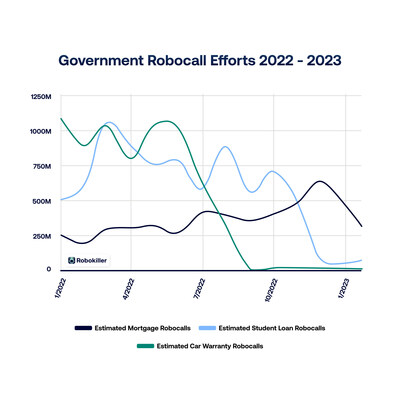Government Efforts to Curb Dangerous Robocalls Are Paying Off, According to Robokiller Insights
NEW YORK, Feb. 6, 2023 /PRNewswire/ -- Americans received an estimated 5.5 billion robocalls in January, a modest increase from December's 5.3 billion and consistent with recent monthly totals, according to Robokiller Insights. Not only has month-over-month robocall growth stagnated, but Robokiller has also observed a drop in some of the most malicious robocall categories: calls involving car warranties (down 35% from December), student loans (down 33% from December), and now home mortgages (down 54% in January, following the FCC's most recent crackdown).
Government efforts have minimized robocalls, but total losses continue to increaseThe decline in these well-known robocalls is partly on account of government actions to curb them. Though government efforts have slowed the growth of some of the most dangerous robocalls, scammers are still yielding significant returns. The average loss to phone scams is $1,200, according to the Federal Trade Commission (FTC), an amount approximately 1 in 3 Americans can't afford to lose. This is a dire problem to solve, as one phone scam could be catastrophic for many.
Robotexts decrease after holiday season surgeAmericans got a bit of a reprieve from robotexts in January, as they returned to normal levels — 14 billion, compared to the 47 billion and 55 billion they received in November and December, respectively. The change marks a 73% month-over-month decrease. The surge during these months, though, was not all on account of scams, as most of these messages (70% to be exact) were brand marketing or promotional messages which Robokiller users marked as spam. Robokiller believes if these brand marketing messages had not occurred, Americans would have received 14 billion and 16 billion messages in November and December, respectively, which aligns with previous month totals in 2022.
Employment and tax season scams may become a threat As more layoff announcements flood the news, scammers may find ways to exploit job seekers with phony offers. Americans should be on the lookout for scams related to employment opportunities, especially with a potential recession on the horizon. In addition, with tax season coming up, Americans should watch out for IRS and social security-related scams as these tend to spike around this time of year.
Coming Soon: 2022 Year In ReviewBe on the lookout for Robokiller's end-of-year phone spam and political message reports. Click here and here to read our previous reports.
Tips on how to stop phone scams:
- Don't answer phone calls or texts from unknown numbers, especially those that call or text at odd hours.
- Don't follow prompts like "Press 1" or click any links.
- Never provide personal information like banking details or other sensitive information.
- Download a spam text and call blocker like Robokiller to equip your phone with the latest technology to stop scams.
About RobokillerWith more than 12 million downloads and $600 million in losses prevented, Robokiller is the leading independent spam call and text blocker. Robokiller has been named a leader in technical and mobile achievement by the Webby Awards, Media Excellence, Best in Biz, and more. Robokiller was named the most effective solution to robocalls by the FTC.
Robokiller's robocall and spam text insights are powered by a global database of millions of phone scams and audio fingerprints. Robokiller's proprietary data insights have been featured by The New York Times, ABC World News, NBC Nightly News, and many others.
Robokiller is available for download in the Apple App Store and Google Play. To learn more, visit www.robokiller.com.
Robokiller, a Teltech brand, is a division of Mosaic Group, an IAC Company (NASDAQ: IAC).
![]() View original content to download multimedia:https://www.prnewswire.com/news-releases/government-efforts-to-curb-dangerous-robocalls-are-paying-off-according-to-robokiller-insights-301739652.html
View original content to download multimedia:https://www.prnewswire.com/news-releases/government-efforts-to-curb-dangerous-robocalls-are-paying-off-according-to-robokiller-insights-301739652.html
SOURCE Robokiller
The views and opinions expressed herein are the views and opinions of the author and do not necessarily reflect those of Nasdaq, Inc.
